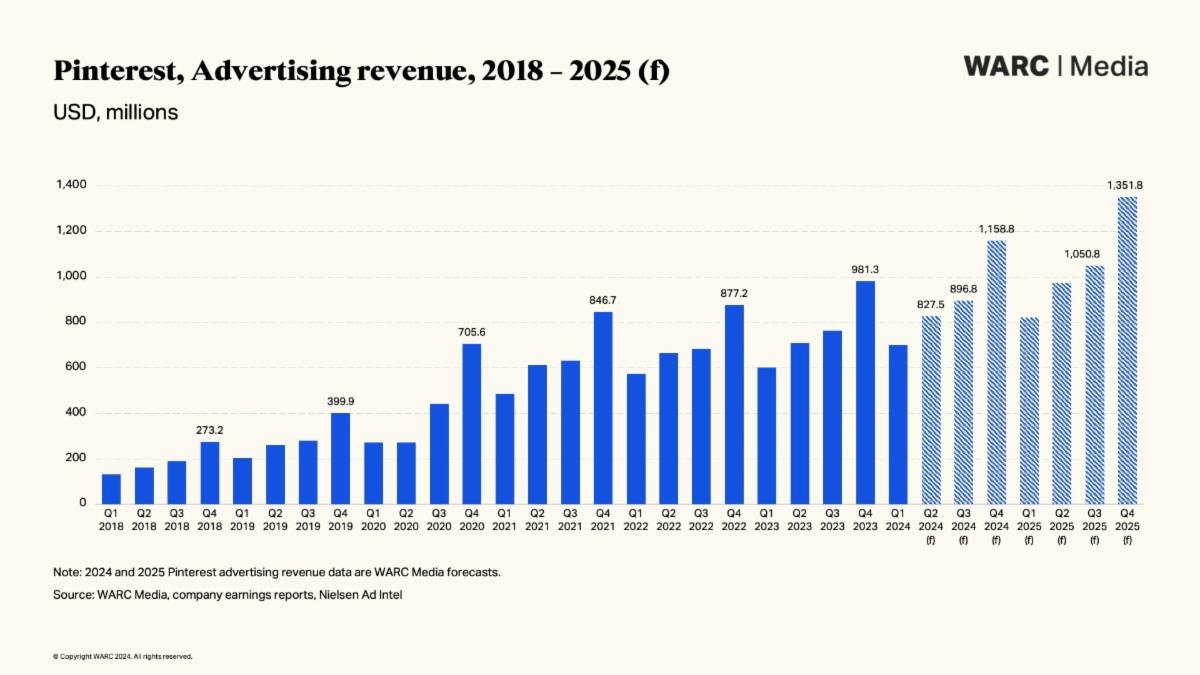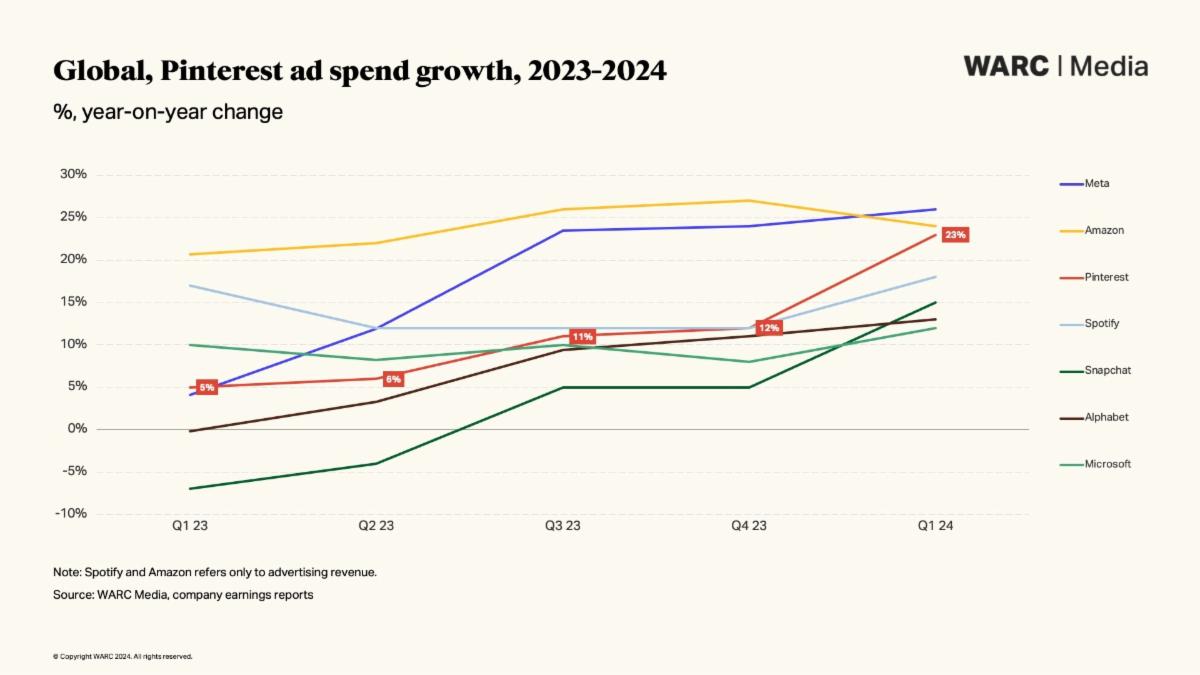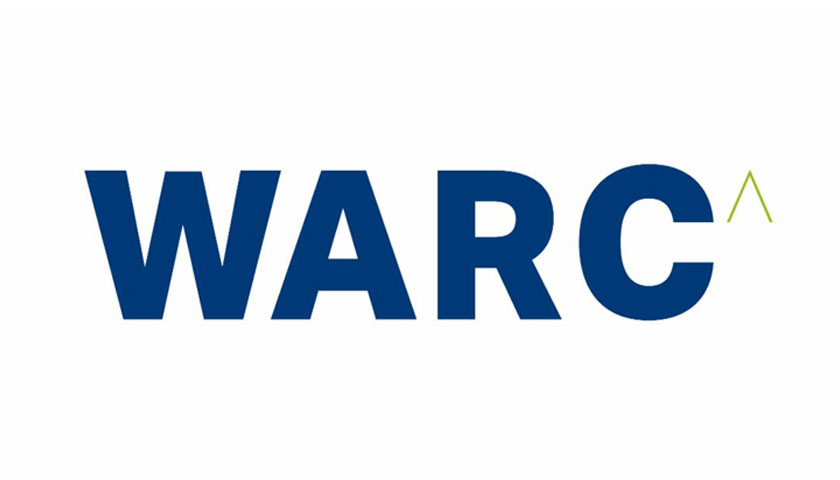|
Pinterest’s commercial momentum is accelerating, with the platform recording its fastest rate of both advertising revenue and monthly active user (MAU) growth since 2021. According to WARC Media, Pinterest’s advertising revenue is forecast to reach $3.6bn in 2024 (+17.3% year-on-year), and will maintain that rate of growth in 2025, with revenue next year set to total $4.2bn. From an audience perspective, Pinterest surpassed half a billion users for the first time in Q1 2024, with its MAU number now totalling 518 million. WARC’s Celeste Huang, author of the report, says: “For so long, Pinterest has been known for upper funnel discovery, where users look for inspiration. However, Pinterest has an audience with high commercial intent. Its advancements in shoppability and AI – alongside a focus on fulfilling users’ ‘multi-session journeys’ – has started to reap rewards, with moves into the performance space attracting additional investment. Among advertisers, trust in Pinterest’s sustainable growth and understanding of its competitive positioning are rising.” Providing evidence-based insights on the challenges and opportunities Pinterest has to offer, this latest Platform Insights report from WARC Media offers an overview of the key data points that advertisers need to know about the platform spanning investment, consumption and performance.
Pinterest is often mentioned alongside Snapchat and Reddit as a “smaller” platform, distinct from digital giants like Meta and TikTok. However, Pinterest is carrying strong growth momentum into the second half of 2024. The platform has refined its position in a highly competitive social media market: effective in upper-funnel discovery, but also capitalising on users with high commerce intent using advanced ad formats. WARC Media forecasts Pinterest’s global advertising revenue to reach $3.6bn this year (up 17.3% year-on-year) and $4.2bn in 2025 (up 17.1% year-on-year) Pinterest’s lower-funnel revenue growth rate “nearly doubled” from Q4 2023. Its monetisation strategy resembles other digital peers: utilise new formats and products to boost user engagement and increase ad load and impression. Pinterest’s growth is strongest in the lower funnel, mainly in the US and amongst the “largest, most sophisticated advertisers”, the platform claims. Such brands are generally “faster” adopters of new ad tools. Emerging categories such as technology generate the most growth in the US, while WARC Media forecasts that the retail category spend on Pinterest will reach $575m globally in 2025. |
 |
 |
Gen Z is now Pinterest’s largest and fastest-growing demographic, making up 40% of all Pinners. Qustodio’s data on kids and teen social media use revealed that Pinterest was used more than Instagram in the US, UK, Australia, and France last year. Younger users go to Pinterest to plan and shop and are quick to react to new content formats like collages. The platform has long been known for brand discovery and product inspiration. Pinners are open to ideas: 96% of top searches on Pinterest are unbranded. However, it is now sharpening its content and shopping strategy to further boost performance and consumers’ “inspiration to action” journey. Since 55% of users see it as a “place to shop”, Pinterest wants to position itself as a “more positive alternative” to other digital environments, especially as social platforms focus on entertainment and human connection migrates to messaging apps. New formats such as Collages are vital to these aims: Collage are shoppable, and users are 3x more likely to save Collage pins than other formats on Pinterest. Nearly 70% of Gen Z create Collages. This helps to create human curation signals to feed Pinterest’s AI to serve more customised ads.
Research by Fospha found that Google Analytics severely underestimates Pinterest’s revenue contribution, with Last Click capturing only 1.3% of its impact. The best-optimised brands on Pinterest spend 23% of their budget on awareness and consideration, and adopt an always-on strategy, the study concluded. Pinterest’s cost-per-acquisition is down 60% year-on-year, per data from Nest Commerce, and its conversion rate continues to grow. Leveraging keywords and interest targets is crucial for lower-funnel success. Data shared by Pinterest itself reported that it can deliver a 28% increase in conversions and up to 96% traffic increases for advertisers. Multi-format campaigns are important here: brands that use videos in their Collection ads see a 44% better ROAS, compared to static Collection ads, according to Pinterest. Moreover, Pinterest’s ad proposition is viewed positively by advertisers and users alike. Kantar’s ad equity metrics revealed improving scores from Pinterest between 2021 and 2023, meaning consumers are less likely to view ads on the platform negatively. Pinterest also ranked as US consumers’ second most-preferred ad platform, with ads seen as “very relevant and useful”. Platform Insights: Pinterest is part of a series of reports exclusive to WARC Media subscribers, which include an overview of platform investments, media consumption and performance insights. This latest report follows Platform Insights: TikTok, Platform Insights: YouTube, Platform Insights: Instagram and Platform Insights: Snapchat. |

